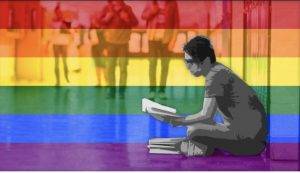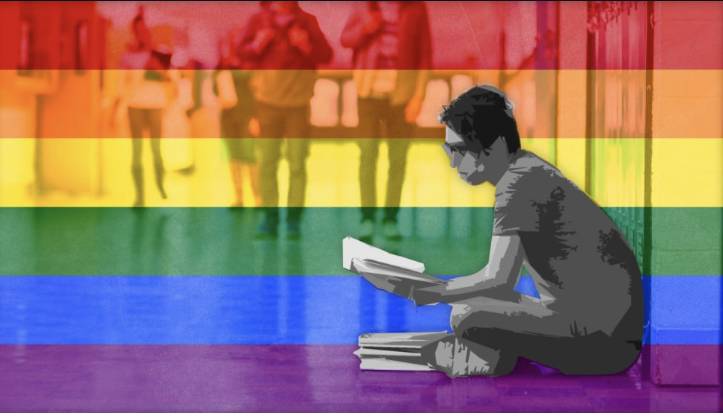
Photo Illustration by The Daily Beast
A school canceled my virtual author visit because they didn’t want their fourth graders to know about my middle grade novel A High Five for Glenn Burke. They didn’t want their fourth graders to know about it because they feared a few loud parents in their community.
The book is about a boy who loves baseball, karaoke, and the movie The Sandlot. Realizing he’s gay, the boy does a school report on Glenn Burke, the gay Major League Baseball player who was erased from sports history because of who he was. It’s a novel about acceptance and living one’s authentic life.
When I found out the school canceled my visit, I was crushed. I wanted to put everyone on blast and name names — the principal, the superintendent, the members of the parents’ association. I wanted to post an open letter to the community because they needed to know that decisions were being made that weren’t in the best interest of their kids.
But I didn’t. I didn’t even though I said I would the next time this happened. I didn’t because it wouldn’t have been in the best interest of the kids living in that community.
I was supposed to visit the elementary school back in March, but the visit was canceled because of COVID-19. The school circled back after the scheduled date and said they wanted to convert my in-person visit into a virtual one. We set the new date for May 14th.
On Friday May 8th, the parents’ association informed me that the principal wanted to see the presentations I’d be sharing with the students. I forwarded them. They’re the presentations I’ve shared with elementary school kids dozens and dozens of times around the country.
On Sunday May 10th, A High Five for Glenn Burke was reviewed in the print edition of the New York Times. To say I was thrilled to have my book featured in the Sunday Book Review is the understatement of the year. Here’s the link to the digital version.
The next day, the parents’ association informed me I wasn’t permitted to mention A High Five for Glenn Burke to the fourth graders. I asked for an explanation and requested that the principal email me. The principal would not. The principal would only speak on the phone. A few hours later, I received an email from the president of the parents’ association informing me my visit was canceled.
I knew what this was. I knew exactly what this was. I’d seen it before. It had happened to me before, and sadly, it will happen again. Educators making bigoted and morally bankrupt decisions at the expense of their students because they fear a handful of parents in their community.
That’s what happened here. The school knows it, too: Their absurdly worded emails. The school administrator – almost certainly on the advice of counsel – unwilling to create additional digital imprints. The parent organization running interference for the school administration. The additional absurdly worded emails setting up specific members of the parents’ association (unbeknownst to them) to be the fall guys and scapegoats. It’s conduct straight out of the censorship playbook.
Of course, if called out, the school will deny it and try to tell another story. That’s what comes next. It always does. They’ll try to confuse the chronology, spin a contrived narrative, and gaslight the community into believing an alternate reality. They’ll do this even with the knowledge that their own emails, texts, and statements contradict and undermine their false claims. All that is straight out of the censorship playbook, too.
In A High Five for Glenn Burke, the main character is realizing he’s gay. Just like some of the fourth graders at that elementary school. I wanted to tell those fourth graders that in a few months when they’re in intermediate school, they should look for the book in their library. In intermediate and middle school, those kids will be trying to figure out who they are and where they fit in. I wanted them to know this book exists because they need to know books like this exist.
It is the duty of schools and educators to accept and protect all kids, not pick and choose which ones to accept and protect. When schools and educators knowingly opt to deny the existence of some of its students, it’s beyond educational malpractice. It’s cruel. It is the moral imperative of schools and educators to respect the humanity of every single one of their kids.
Every single one — black kids, brown kids, Jewish kids, immigrants, girls, Muslim kids, Asian kids, queer kids.
Everyone.
Last week, I filed a report with the American Library Association Office for Intellectual Freedom. I drafted my open letter. Shared it with several author friends. Shared it with my publisher.
But the more I sat with it, the more I realized an open letter to this community was not in the best interest of their kids.
Shortly after A High Five for Glenn Burke came out, Pernille Ripp, a middle school educator and the creator of the Global Read Aloud, posted a review. In it, she wrote:
“So I write this post …for us, the adults, in the lives of these children to understand just how much it matters for our kids to be seen. How much they hope to be represented in our libraries, in our classrooms, in our curriculum, in our teaching staff. That some kids don’t get to be accepted at home so they hope that school is the place where they will be. That some kids face hatred before they come into our rooms and hope that with us they will be accepted for whoever they are, wherever they are on their journey. And they hope but it doesn’t always happen and soon they learn to hide that part of themselves, because it is safer to live half-hidden than be known for all that they are.”
Some kids are hated at home, and yes, it’s as horrible as it sounds. And it’s exponentially worse right now because some of those kids are quarantining in unsafe and even dangerous environments.
We know how this school truly feels about its students. They may say they care about all of them, but their actions say otherwise. They do not stand up for all their kids. Some are ignored and erased. And during this moment of pandemic learning, it’s even easier for the school to ignore and erase those kids. Make like they don’t even exist.
My heart aches for the queer kids in this community, especially the ones sheltering in place in toxic homes. I didn’t want to pile on the harm. I didn’t want to risk making their lives even the slightest bit more difficult. And when in-person schools reopen, we know they’ll be returning to a hostile and unsafe space. I didn’t want to exacerbate their situation.
So then why say anything at all?
Because people need to know this kind of bigotry and hatred continues to happen, bigotry and hatred aimed at kids. People need to hear about it. It needs to be out in the open.
Educators who fear parents to the point of knowingly making decisions that are not in the best interest of all children have no business teaching children. Educators who let a handful of loud parents dictate school policy at the expense of the children they’re entrusted to protect are no better than those bully parents. Educators who are afraid to stand up for all their kids are bullies.
Every single kid matters. Everyone is appropriate. No one is controversial. Everyone has the right to exist.
Everyone.

